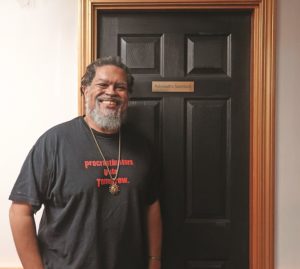“I grew up in both the Bronx and Mashpee,” says Morgan James Peters, also known as Mwalim DaPhunkee Professor, in his recording studio, Polyphonic Studios, in Buzzards Bay. “My mom’s family was from Barbados, and my dad’s family was Mashpee Wampanoag.”
Mwalim might be one of the most interesting people to regularly cross the Bourne Bridge. A violist, pianist, singer, and percussionist, he is a founding member of the GroovaLottos, the Grammy-nominated soul-funk-blues band that played downstairs at the Governor Bradford in Provincetown all summer in 2019. Among the other hats he wears: playwright, actor, storyteller, Freemason, professor, and human rights advocate.
He started playing the viola at age 10. As a teenager, he played at Carnegie Hall with the Bronx Borough-wide Orchestra. His grandfather was his first piano teacher. “He was trained as a concert pianist,” says Mwalim, “but he got to this country and found there was no such thing as a black concert pianist, so he started leading a jazz band, and started doing arranging.” Mwalim went on to study piano with jazz legend Barry Harris.

He first became interested in record production at the age of 16. “Foreshadowing,” Mwalim says theatrically of his precocious ambitions. “To be honest, the thing that really made me first interested in having a recording studio was an episode of The Brady Bunch. When you’re a kid and you’re listening to the radio, you think the band is in the studio performing.”
Around this time, he asked to sit in on recording session at Planet Studio NYC in Manhattan. He happened to have lugged along his viola case. “They were doing string parts,” says Mwalim. “The guy looks at me and says, ‘Do you play that thing?’ I thought it was a weird question. I felt like saying, ‘Nah, I just carry it to look cool.’ ”
The folks at Planet had him do some multitrack recording. “It was the first time I heard myself playing against myself,” says Mwalim. “Turns out, that was a recording session with a staff producer for [the record label] EMI. That technically made me one of the youngest session players in EMI history.”
Mwalim received a scholarship to study music and composition at Boston University. While there, he was increasingly drawn to film and theater, specifically immersive theater. After graduating from B.U., he studied playwrighting at the New African Company. He traversed the Boston and New York City performing arts scenes before returning to Mashpee in 2002, after the birth of his son.
All of these experiences shaped his artistic identity. “Coming out of classical and symphonic traditions allowed me to recognize parallels, see where lines crossed,” he says. “For example, a lot of people don’t think about how funky Bach was. Bach and Telemann, they were basically playing funk. That’s what fugues and themes and variation are.”
In 2009, Mwalim founded the GroovaLottos with drummer Eddie Ray Johnson, who died just this year. “We locked immediately, musically, in terms of our sense of humor,” says Mwalim. The group’s music is influenced by funk, rhythm and blues, electronic dance music, hip hop, and symphonic music.
The idea to start Polyphonic Studios came to him last September. Because its opening coincided with the pandemic shutdown, Polyphonic first focused on post-production work and mixing. Now, it’s allowing in-person recording, with proper precautions. “Recording studios, in general, see home recording as the enemy, and we don’t,” says Mwalim. “We see it as an ally.”
For Mwalim, human rights and the performing arts have always gone hand in hand. “I came to recognize that the Cape, when it came to diversity and inclusion, was, and still is, way behind the rest of the country,” says Mwalim. “I went to one audition where they stopped me at the door: ‘We don’t have any black roles.’ They were doing Brigadoon.” He also says he has experienced casual racism when busking around the Cape.
Mwalim currently teaches creative writing at UMass Dartmouth, hence the “Professor” in his stage name. He was also chair of the black studies department there for five years. He campaigned to change the department’s name from “African and African-American studies” to “black studies,” after surveying his students.
Even that’s not enough to keep him busy: he has been a member of the Barnstable County Human Rights Advisory Commission since last January. “I’ve always been interested in human rights, equity, social justice,” says Mwalim. “It’s just kind of ingrained. It has always been an interest of mine.”
Mwalim is featured in a short YouTube video promoting the Human Rights Commission, which is currently recruiting new members. It’s online here: youtube.com/watch?v=Zl_tWvU6Ado.



